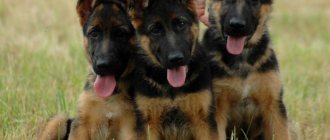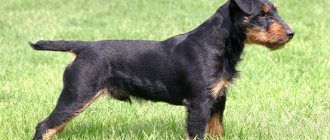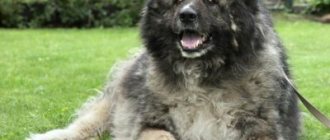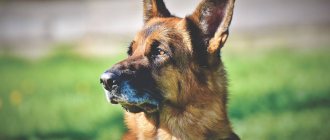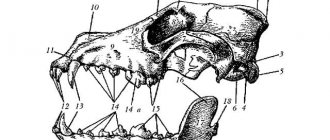What and how to feed the Caucasian Shepherd falls entirely on the shoulders of the owner; it is quite difficult for unprepared people to resolve this issue. Let's figure out what is necessary for proper nutrition of a dog and how to calculate the necessary needs correctly.
The Caucasian is a large dog that needs good and precisely balanced nutrition that meets all requirements. There are different ways to provide a friend with good feeding. The quality of food determines how much the puppy will develop and how the condition will be maintained in adulthood.
This attitude is necessary, because the quality of life depends on proper care of your pet.
What to feed a Caucasian Shepherd puppy and an adult
Feeding for the Caucasian Shepherd can be of two types:
- Natural – self-cooking from natural products;
- Feeding with prepared foods - dry food, canned food, natural food with industrial processing.
Ready-made feed
Each of these methods has its own advantages and disadvantages. Both options are acceptable, but as practice shows, the simplest of them is ready-made food. They are already calculated, balanced and do not require preparation. Calculating the amount is very simple - just know the weight and age of the dog; manufacturers indicate on the packaging how many grams per day the pet should receive.
In addition, you will not need to buy vitamins, mineral supplements or give bone meal. All this is already provided for in it. Storage without any special features, if you calculate the cost of natural food and a bag of feed, it turns out to be a more than useful benefit.
- You need to choose food based on the age, physical activity and breed characteristics of the animal. Manufacturers produce lines that fully take into account these conditions, which allows you to quickly and easily select food.
The advantage of choosing is on the side of proven brands that meet all the parameters:
- Go natural;
- Purina PRO plane;
- Almo Nature;
- Orijen;
- Brit Premium.
Food is selected separately for babies, nursing and pregnant bitches, adult dogs and elderly animals. Puppies require more high-calorie nutrition, older dogs less, and adults need a higher content of protein and vitamins.
Much depends on the breed and physical activity levels; it is also worth remembering that each animal is individual. Often a person may encounter allergic reactions in a pet to one or another element, in which case a change in diet occurs.
It is important to maintain a drinking regime; the dog must have access to water.
When switching to a new diet, it will take time; the addition will be gradual, in small amounts until a complete change occurs. You should not mix two types of food: natural food and dry food.
Natural nutrition
Natural food is quite difficult to prepare and requires certain knowledge. Product calculations must be accurate. The Caucasian is a large dog, he will need a fairly large amount of protein, vegetables/fruits and porridge.
The meals are prepared according to the following principle: 30% of the total is protein, 20 is vegetables/fruits/greens and 10 is porridge.
The puppy has a precise regimen, a limited amount of food that is calculated in advance, and a feeding schedule. Up to 2 months, the baby will receive a special menu, approximately the same as a nursing bitch.
All products are introduced gradually, each of them has its own processing and preparation features.
Important. In addition to this method, the following are selected: vitamins and mineral supplements, additional calcium supplements, vegetable fats.
What type of food to choose for a Caucasian Shepherd
Caucasian Shepherd dogs are fed either natural food or dry food. Mixing both types of food is prohibited.
Sudden changes in diet lead to digestive problems.
Ready-made dog food
More and more owners prefer to feed their Caucasian Shepherds with industrial food.
Advantages of this approach:
Caucasian Shepherds are fed only premium, superpremium and holistic products. It contains natural meat, grains, vegetables, vitamins and minerals, so it fully satisfies the body's needs.
Cheap economy-class foods add flavorings, dyes, flavor enhancers and preservatives. Instead of meat, the composition includes meat waste (about 4%), and the rest is soy and ballast substances. If you constantly feed your pet such food, health problems are inevitable.
Breeders recommend giving Caucasian Shepherds the following brands of products for large/giant breeds:
- Acana;
- Go! Natural;
- Purina Pro Plan;
- Almo Nature;
- Orijen;
- Brit Premium.
The food must be appropriate for the size, age and condition of the pet. Separate lines are produced for puppies, pregnant, lactating, elderly and sick animals.
Natural products
Proponents of natural foods prefer this type of nutrition because:
- it is closest to the natural, “wild” diet of animals;
- the Caucasian Shepherd always gets fresh food;
- the owner chooses the products himself, which means he is confident in their quality.
With a natural diet, the majority of the diet (about 50%) of Caucasian Shepherds consists of meat. It can be any low-fat variety - beef, chicken, turkey.
Pets are given offal a couple of times a week. They are lower in calories, but contain many useful substances.
Caucasian Shepherds can be fed:
- liver;
- kidneys;
- heart;
- udders;
- lungs;
- scar.
Sea fish is beneficial for dogs - it is a source of easily digestible protein and phosphorus. It is included in the diet 1-2 times a week instead of meat.
The daily menu includes rice, buckwheat, and oatmeal, which provide the body with energy. It is not recommended to feed semolina, millet and corn grits - they do not carry any nutritional value.
To maintain intestinal health and replenish calcium reserves, fermented milk products are given. Suitable for Caucasian Shepherds:
- cottage cheese;
- kefir;
- fermented baked milk;
- curdled milk;
- natural yogurt.
They should not contain dyes, flavors or sweet fillers.
It is recommended to give Caucasian Shepherd dogs vegetables containing a large amount of useful substances: pumpkin, carrots, cucumbers, zucchini. It is advisable to add fresh herbs to food: parsley, dill, lettuce.
As a reward, you can give fruits and seasonal berries: bananas, apples, pears, peaches, watermelons, currants.
Caucasian Shepherd Dogs are fed raw chicken or quail eggs no more than 2 times a week. If the owner doubts their quality, it is recommended to soft-boil them.
In the first 12 months
Nutrition for the Caucasian Shepherd is extremely important during this period. The body develops and actively grows, the lack of some elements or its excess can lead to irreversible consequences.
While the puppy is growing, you will need to carefully monitor the quantity and quality of the menu. He needs:
- At 1.5 – 2 months – 230 – 250 grams of protein;
- 3 – 5 months 260 – 410 grams;
- 5 – 7 months: 420 – 550;
- 8 – 12 months – 510 – 900 grams.
Protein comes not only from meat and offal; you will also need dairy products, especially at the initial stage of development.
Meat and other products
Typically, preference is given to lean meat with minimal fat content:
- Chicken. Skinless, boneless, raw. It is worth remembering that not everyone can tolerate chicken; you may be allergic to it; if you notice signs of an allergic reaction or digestive upset, replace it.
- Beef. Only lean, first freshness, cleaned of veins and bones, chopped into small pieces, without heat treatment.
- Turkey. Boneless, skinless, finely chopped.
- Veal. Without veins and seeds.
As an addition in older age, chicken necks, large cartilage - give as goodies, chew. In specialized stores, you can buy “stringy bones” that are great for gnawing.
- Fish. Only sea fish, always cleaned of bones, without heads and entrails. Give 2 - 3 times a week, contains a lot of protein and phosphorus. You can't give river water.
- Offal. You can diversify your diet with the help of offal; it is important to rinse and boil as thoroughly as possible, without salt or other spices.
It can be:
- Liver;
- Kidneys;
- Heart;
- Neck;
- Offal (stomach);
- Lung.
- Milk: a must in the diet, with minimal fat content. From liquid - kefir, fermented baked milk, yoghurts without additives and sugar, grain cottage cheese. Cheese with only a minimum percentage of fat content.
- Cereals and porridges: cooked in water or broth. Without salt and spices. Buckwheat and rice are the most popular. It’s better not to cook oatmeal, but just brew it. Exclude legumes and millet.
- Vegetables and fruits: raw, finely chopped, chopped or grated. Zucchini, eggplant, pumpkin, cucumbers, carrots, tomatoes (not in large quantities), cauliflower, broccoli, white cabbage, bell peppers. Omit potatoes. Melon and watermelon.
- Fruits: apples, pears, bananas, seasonal berries. Exclude grapes and plums, as well as citrus fruits.
- Greens: parsley, dill, leafy green lettuce, celery.
- Eggs: given raw, no more than 2 times a week, be sure to check the freshness.
Feeding from three months to six months
Almost all representatives of this breed grow up to ten months of age. When this period is reached, dogs of the Caucasian breed already look like adults.
Their growth and weight slows down and stops.
But some dogs grow up to the age of three. This is because the older the dog, the stronger its bones and muscles. They give additional load.
At one and a half years, growth stops completely, but weight may still increase.
Starting from the age of three months, Caucasians are transferred to four meals a day - sea fish can be gradually introduced into the menu, after first freeing it from fins and bones. Add a spoonful of sunflower oil and finely chopped herbs and boiled vegetables to the porridge. The daily meat requirement is 350 g.
Determine the serving size based on how your student behaves. He should finish eating in 15 minutes - if he stands at the bowl for a long time, choosing tastier pieces, take the food away and give him a smaller portion at the next meal.
READ Balinese cat - photo, description of the Balinese character and characteristics of the breed
Don't forget about raw vegetables and fruits, grated - cabbage, beets, carrots, apples, greens are suitable. In the evening, prepare vegetable salads with kefir or sunflower oil. Dairy ingredients can be offered once a day. After a Caucasian turns six months old, he is retrained to eat two meals a day, the bulk of which consists of meat and offal.
At two months
At 2 months old, a Caucasian puppy can already be fed with many additional foods, as well as given into new hands. By this time, they try cottage cheese, porridge, many vegetables and even meat.
- Or by this time they completely switch to food, while many of them may still receive mother’s milk. If a child moves to a new home, he continues to receive the same benefits as from the breeder.
In a new home, he gradually gets accustomed to new food; it is introduced gradually and in small portions. Feeding 4 - 5 times a day, in small portions with an interval of 4 hours.
What to feed during pregnancy and after childbirth
During the first 3 weeks of pregnancy, embryos develop slowly, so there is no need to change the diet of the expectant mother.
As the fruits grow, they begin to put pressure on the stomach and internal organs. From the 4th week the number of feedings is increased to 3 times a day, from the 7th week - to 4-5 times.
The daily amount of food is increased weekly by 10%.
Main products included in the diet:
- meat;
- boiled liver;
- cottage cheese;
- vegetable salads and greens with vegetable oil;
- sea fish.
For your information. When feeding dry food, the dog is switched to products from the lines for pregnant women.
To replenish the supply of minerals, phytin, calcium gluconate, vitamins A and D, or special preparations for pregnant women are given. The dosage and schedule of administration are determined by the veterinarian.
From the 8-9th week, meat is excluded from the diet. Instead, the dog is fed sea fish because it is better digestible. But the amount of fish is increased by a third due to its low calorie content.
6-8 hours after the puppies are born, the dog begins to be fed liquid porridge and fermented milk products. Meat is returned to the diet gradually, in small portions.
The dog is still fed 3-4 times a day. The amount of food depends on the size of the litter. If there are four puppies, the volume is increased 2 times, if there are eight - 3 times.
With the start of complementary feeding, portions are reduced. After the cessation of lactation, a fasting day is arranged - they give ¼ of the usual menu and limit drinking. Then they smoothly return to normal mode.
Puppy feeding schedule
Approximate feeding schedule for a baby:
- From 2 months: 5-6 times a day, with a 4-hour break between them.
- 3-4 months: 4-5 times a day, break 5 hours.
- 5 – 7 months: 3 -4 times;
- 7 -12 months: 3 – 2 times.
- From 12 months: the pet switches to 2 doses a day.
Feeding:
- In the morning: porridge with meat/vegetables/greens;
- For lunch: cottage cheese;
- Afternoon snack: kefir;
- Dinner: porridge with meat/greens/fruits;
- Late dinner: vegetables/porridge.
Supplements and vitamins for shepherds
The baby is on a natural diet, receives a complex of vitamins and calcium supplements - for growth and development. In this case, the most optimal option is selected that will complement the menu.
The conditions for taking each vitamin or calcium supplement are different; before purchasing, consult with a specialist at the veterinary store and your doctor.
Adults can receive supplements - in winter, lactating and pregnant bitches receive special courses of multivitamins.
How many times a day to feed
Puppies have small stomachs, so they are fed often and in small portions. Up to two months, complementary foods are given 6 times a day every 4 hours.
As the puppy grows, the portions increase and the frequency of feedings decreases:
Age, months Number of feedings per day
| 2-3 | 5 |
| 4-6 | 4 |
| 7-12 | 3 |
After a year, the Caucasian Shepherd eats 2 times a day. In summer, you can limit yourself to one feeding, because the pet does not need to waste energy on heating.
If the dog is fed natural products, the amount of food is calculated using the formula: 40 g of food per 1 kg of animal weight.
That is, a dog weighing 60 kg should eat about 2.4 kg of food. When feeding with prepared food, follow the manufacturer's recommendations indicated on the package.
Malnutrition threatens developmental delays, and overfeeding threatens problems with the digestive system.
Nutrition of the Caucasian Shepherd after a year
It is better to feed an adult dog at home 2 times a day after walking. The diet consists of the proposed, permitted products. The calculation is based on the following indicators:
- Pet's weight;
- His physical activity is residual (walking/active games);
- Age.
Based on weight, you will need to calculate: 30 grams of protein (meat/offal/fish) per 1 kg of animal. Porridge accounts for 10% and 20% for vegetables/fruits/greens.
Approximate daily diet:
- Buckwheat porridge with tripe, grated medium carrot, zucchini, raw egg.
- Rice porridge/sea fish with broccoli and tomato, dill and parsley.
- During the day: apple and pear.
Feed calculations are indicated on the packages; a measuring cup is usually included. Feeding with dry food is much simpler and more profitable in terms of price and quality.
Feeding the Caucasian Shepherd
You can feed your dog regular foods, preparing them every day (porridge, meat, cottage cheese, vegetables, etc.).
You can feed dry food according to the dosage indicated on the package, or you can accustom the dog to a mixed type of feeding - products with the addition of dry food, or food, and at certain times (busy rhythm of life, travel, etc. Food products that can be natural dog foodMeat and meat products. From this range, beef and horse meat are optimal. It is generally accepted that pork should not be given to dogs. However, a Caucasian Shepherd dog kept outdoors in the cold season spends a lot of energy, so a certain amount of well-cooked pork can be added to porridge.
In addition, dogs are often fed organ meats. These include tripe, heart, liver, trachea, lips, ears, tails, lung, kidneys, udder, trimmings, head, blood, etc...
By-products are less nutritious than meat, therefore, when feeding them, the volume of meat products increases by 1.5-2 times. Scar is considered the most suitable. The liver, heart, lung, kidneys must be thoroughly boiled to avoid infection with worms. The udder is boiled twice, the first water is drained.
Poultry meat stands out separately. Chicken is a valuable dietary food. It is usually given to sick dogs, often to puppies. Tubular chicken bones should not be given, raw beef bones, and cartilage are allowed to be chewed from time to time, while the dog strengthens and cleans the teeth. Make sure that the volume of bones eaten is not too large, so as not to create difficulties with digestion, leading to intestinal blockages. Boiled bones should not be given.
Dogs are also given meat and bone meal mixed with other foods (up to 100 g per day).
Fish. Fish is a good source of phosphorus. It must be included regularly in the diet. However, the nutritional value of fish is 1.5-2.5 times lower than that of muscle meat. In addition, cheap types of fish (pollock, hake, sprat, perch, etc.) with constant and abundant feeding can cause certain harm to the dog’s health.
We suggest you read: Why a cat doesn’t go to the toilet - Tips for keeping cats
Other animal products. It is useful for dogs and puppies to be given chicken eggs, especially during the period of intensive growth of puppies and when dogs are involved in breeding (mating, whelping). They are only given not constantly and in limited quantities - 2-6 pieces per week, the protein is only boiled.
Dogs working outside and in enclosures, especially in the cold season, are given animal fats (lard, butter) in limited quantities.
Prohibited Products
Food without salt and spices. Human food in the form of soup, cabbage soup, canned food and semi-finished products should be completely excluded. It is prohibited to give in any quantity:
- Pasta;
- Potato;
- Tubular bones;
- Chocolate, sugar and other sweets;
- Butter pastries;
- Sausage, frankfurters, smoked meat;
- Salo;
- Mushrooms;
- Dried fish;
- Refrain from table scraps.
The owner chooses the Caucasian Shepherd and what to feed it. It is best to consult a doctor or breeder in advance. Usually, before the new owner takes the baby into the house, breeders recommend food and talk about all the features of the diet.
Share link:


